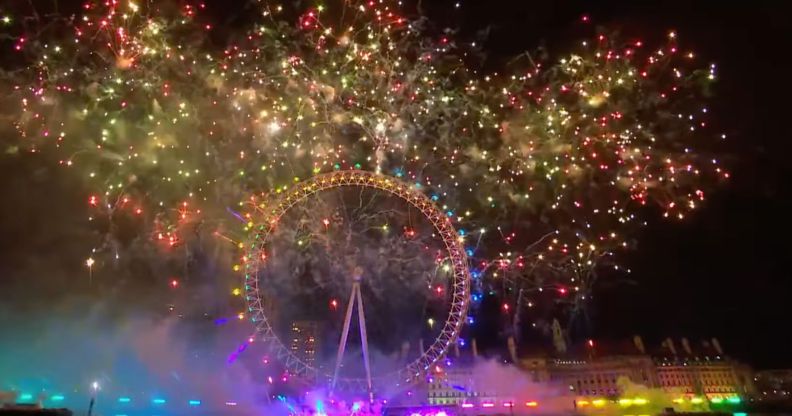London New Year’s Eve fireworks praised for beautiful ‘we’re here, we’re queer’ Pride message

Viewers praised London’s New Year’s Eve fireworks display for including a segment honouring 50 years of Pride in the UK. (BBC)
BBC viewers were delighted when the London New Year’s Eve fireworks display included a message of LGBTQ+ Pride.
The capital rang in 2023 with its traditional fireworks (and drones) display, which depicted the Lionesses’ history-making Euro 2022 win, sent a message of support for Ukraine and paid tribute to the late Queen Elizabeth II.
It also marked 50 years of London’s Pride with a message from veteran activist Peter Tatchell ringing out across the city: “We are here, we are queer and you’d better get used to it.”
The message was accompanied by LGBTQ+ anthems – Cher’s “Believe” and “I’m Coming Out” by Diana Ross – and a kaleidoscopic display of fireworks that lit up the sky and the River Thames.
Millions of people watched the celebration on the BBC, and many took to social media to gush over the inclusion of a segment honouring 50 years of Pride in UK.
The reception wasn’t all positive, however. A number of “gender critical” Twitter users complained about the BBC broadcasting the word “queer”, describing it as a “homophobic slur”.
The LGBTQ+ community has been reclaiming “queer” since the 80s, to the point where the modern, positive definition is listed in dictionaries.
This New Year’s Eve was the first time since 2019 that people were able to gather along the Thames embankment to watch the 12-minute firework display in London, which was organised by mayor Sadiq Khan’s office.
Other music heard during the display included hits from Neil Diamon, Stormzy, Rihanna, Kylie Minogue and Calvin Harris before the traditional “Auld Lang Syne”.
Khan, who has been a frequent attendee of LGBTQ+ Pride events in the city during his time in office, shared a message of unity and allyship with the LGBTQ+ community on Twitter.
“Here in London you are free to be whoever you want to be, and love whoever you want to love,” Khan wrote, posting a picture from the LGBTQ+ segment of the fireworks display.
Tatchell told PinkNews that it was great the Mayor of London decided to highlight 50 years of Pride during the New Year’s celebrations.
“That’s a first. It is a sign that London has a Mayor who is on our side and embraces the LGBT+ community,” he said.
“The LGBT+ segment of the fireworks had a huge impact. It was witnessed by millions of people, either on the River Thames or watching on TV.”
While many celebrating the LGBTQ+ segment, there were a few voices online who objected to the inclusion of the word ‘queer’ in the segment, claiming it hurt the community. This is despite the community broadly reclaiming the word in recent decades.
“Those who object to the use of the word queer missed the point,” Tatchell said. “It was used in a positive, affirmative sense, reclaiming a homophobic slur as a symbol of pride, defiance and celebration.”
2022 marked the 50th anniversary of Pride in the UK.
On 1 July 1972, hundreds of Gay Liberation Front members marched through the streets of London to demand radical political change in what became known as the nation’s first-ever Pride march.
On the 50th anniversary of that historic day, some of the members of the original movement, who marched decades earlier, took to those same streets as a celebration and a reminder of the annual event’s revolutionary roots.
Nettie Pollard, an activist who took part in the original GLF march, told PinkNews that the 1972 march was a “lovely experience” because it meant being out and coming together with “so many other LGBTQ+ people”.
“Ever since April of ’71 I’d been wearing a GLF badge all the time so I was very familiar with people’s reactions to gay people,” Pollard recalled. “I didn’t feel the least bit worried about the march – for some of the people, it was the most enormous step to go out in public.”
Stuart Feather, another activist at the 1972 march, described how there were “maybe 500” people gathered together on that day so it felt “very secure” and safe. Feather remembered how “exciting” it was to see people dressed in drag, makeup and nail varnish demanding change in society and from the government.

